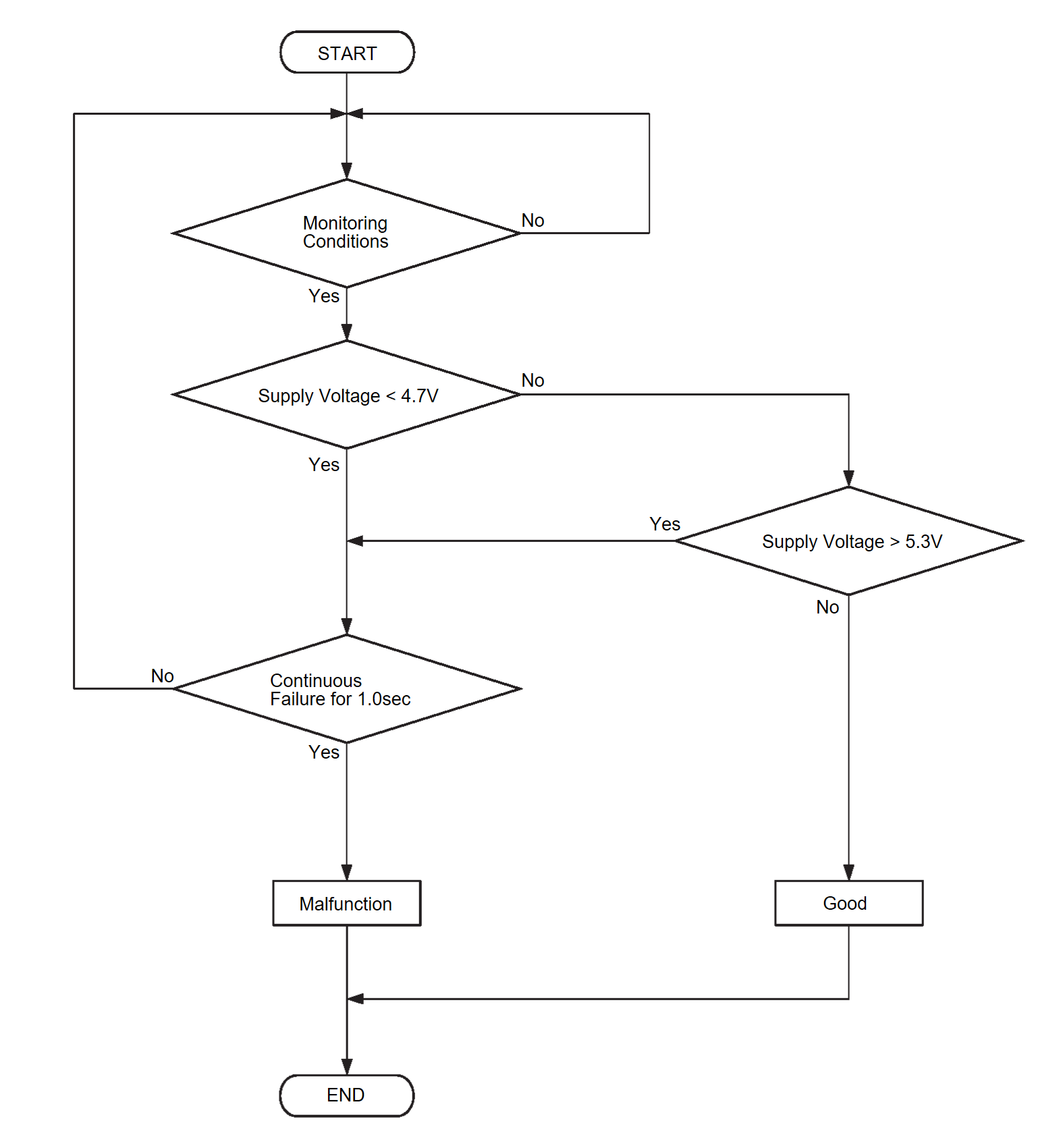DTC No. P1B02-1C: Sensor Power Supply Voltage (AVCC) Diagnosis
MONITOR EXECUTION
- Continuous
MONITOR EXECUTION CONDITIONS (Other monitor and Sensor)
Other Monitor (There is no temporary DTC set in memory for the item monitored below)
- Not applicable
Sensor (The sensor below is determined to be normal)
- Not applicable
DTC SET CONDITIONS
Check Condition
- Battery Management Unit (BMU) power supply voltage is more than 7.578 volts.
- Time after above conditions satisfy is 1 second or more.
Judgment Criterion
- The sensor supply voltage is less than 4.7 volts, or more than 5.3 volts for 1 second or more.
TROUBLESHOOTING HINTS
- Damaged wiring harness and connectors
- Malfunction of the junction box No. 2
- Malfunction of the BMU
DIAGNOSIS
Required Special Tools:
- MB992744: Vehicle communication interface-Lite (V.C.I.-Lite)
- MB992745: V.C.I.-Lite main harness A
- MB992747: V.C.I.-Lite USB cable short
- MB992748: V.C.I.-Lite USB cable long
- MB991223: Wiring harness set
- MB992006: Extra fine probe
1.Check of other DTC
Check whether the BMU and BMU2 set the following DTC. Troubleshoot the set DTCs (Refer to DIAGNOSTIC TROUBLE CODE CHART
Troubleshoot the set DTCs (Refer to DIAGNOSTIC TROUBLE CODE CHART ). Then,
). Then, 
- DTC No. P0A1F-00 ECU Internal Failure
Is the DTC set?
 Troubleshoot the set DTCs (Refer to DIAGNOSTIC TROUBLE CODE CHART
Troubleshoot the set DTCs (Refer to DIAGNOSTIC TROUBLE CODE CHART ). Then,
). Then, 
2.Test the OBD-II drive cycle.
(1) Carry out a test drive with the drive cycle pattern. Refer to OBD-II Drive Cycle OBD-II DRIVE CYCLE .
.
 .
.(2) Check the DTC.
Is the DTC set?
 The trouble can be an intermittent malfunction (Refer to General Information - How to Use Troubleshooting/Inspection Service Points, How to Cope with Intermittent Malfunctions HOW TO COPE WITH INTERMITTENT MALFUNCTIONS
The trouble can be an intermittent malfunction (Refer to General Information - How to Use Troubleshooting/Inspection Service Points, How to Cope with Intermittent Malfunctions HOW TO COPE WITH INTERMITTENT MALFUNCTIONS ).
).3.Drive battery control wiring harness check (Current sensor power supply line, signal line, ground line)
(1) Disassemble the drive battery (Refer to SERVICE PROCEDURE ).
).
 ).
).(2) Check the following wiring harness for short to ground circuit.
- Between the BMU connector (ISENV terminal) and junction box No. 2 connector (terminal No. 3)
- Between the BMU connector (ISEN1 terminal) and junction box No. 2 connector (terminal No. 7)
- Between the BMU connector (ISEN2 terminal) and junction box No. 2 connector (terminal No. 9)
(3) Check the following wiring harness for open circuit.
- Between the BMU connector (ISENV terminal) and junction box No. 2 connector (terminal No. 3)
- Between the BMU connector (ISEN1 terminal) and junction box No. 2 connector (terminal No. 7)
- Between the BMU connector (ISEN2 terminal) and junction box No. 2 connector (terminal No. 9)
- Between the BMU connector (SGND terminal) and junction box No. 2 connector (terminal No. 10)
Is the check result normal?
4.Drive battery control wiring harness check (Current sensor power supply line, signal line, ground line)
Check the following wiring harness for damage. Replace the junction box No. 2 and BMU (Refer to SERVICE PROCEDURE
Replace the junction box No. 2 and BMU (Refer to SERVICE PROCEDURE ). Then,
). Then, 
- Between the BMU connector (ISENV terminal) and junction box No. 2 connector (terminal No. 3)
- Between the BMU connector (ISEN1 terminal) and junction box No. 2 connector (terminal No. 7)
- Between the BMU connector (ISEN2 terminal) and junction box No. 2 connector (terminal No. 9)
- Between the BMU connector (SGND terminal) and junction box No. 2 connector (terminal No. 10)
Is the check result normal?
 Replace the junction box No. 2 and BMU (Refer to SERVICE PROCEDURE
Replace the junction box No. 2 and BMU (Refer to SERVICE PROCEDURE ). Then,
). Then, 
5.Test the OBD-II drive cycle.
(1) Carry out a test drive with the drive cycle pattern. Refer to OBD-II Drive Cycle OBD-II DRIVE CYCLE .
.
 .
.(2) Check the DTC.
Is the DTC set?
 Retry the troubleshooting.
Retry the troubleshooting. The procedure is complete.
The procedure is complete.![[Previous]](../../../buttons/fprev.png)
![[Next]](../../../buttons/fnext.png)
